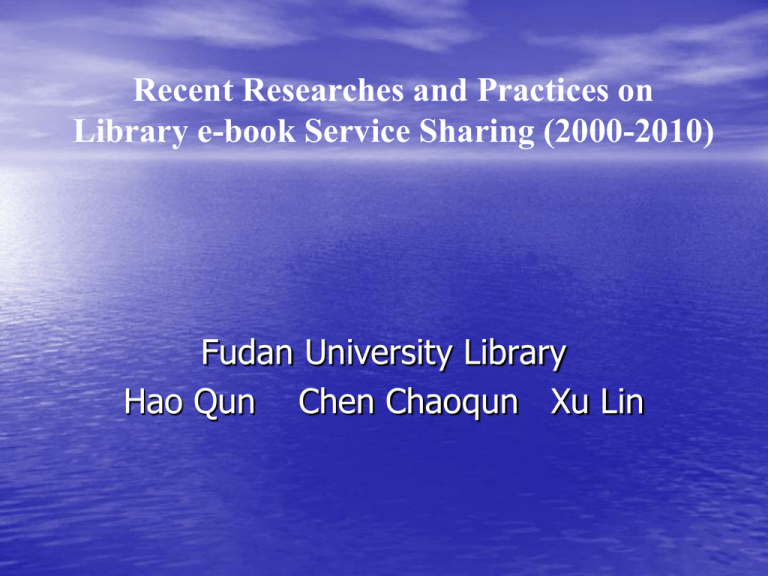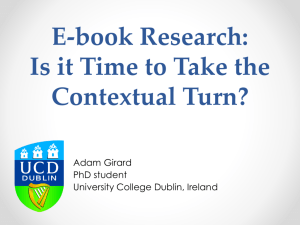Qun-Hao
advertisement

Recent Researches and Practices on Library e-book Service Sharing (2000-2010) Fudan University Library Hao Qun Chen Chaoqun Xu Lin The rapid development of the e-book the increase of e-books’ types and quantities the popularization and development of e-book readers more and more libraries begin to provide e-book service to readers Mark R. Nelson “E-book in higher education: Nearing the end of the era of Hype?”——EDUCAUSE Research Bulletin, January 8, 2008 China Book Business Report • November 21, 2008, NetLibrary released a survey result about the electronic collections in Britain. The OCLC eContent team found that three-fourths of the academic libraries and half of the public libraries prepared to increase their e-book collection in 2009, even if they are in great shortage of funds. • December 27, 2009, Amazon announced that its e-book sales prevailed over physical books for the first time. Research Path Time Span:2000-2010 Domestic and foreign monographs\papers\meetings about “Library e-book services” Library e-book reader lending practices Domestic papers:Quantity Choose“e-book”as keyword to search in CNKI,find: The core journals published 104 articles and news reports , The ordinary journals and internal journals published about 84 Domestic papers:frequency 2000-2010国内各主要期刊电子图书论文统计 20 15 核心 非核心 10 5 0 核心 非核心 2000 2001 2002 2003 2004 2005 2006 2007 2008 2009 2010 2 2 14 7 14 8 15 5 9 15 11 8 9 10 2 10 11 10 11 6 6 3 • 发表在《国立成功 大学图书馆馆刊》 第六期(民国89年 10月) Domestic papers:Topics(1) • The concept\ the development history of e• • • • • books and the impact on library E-books’ preserve, catalogue, metadata, retrieval, the content and format checks , the integration with OPAC Comparative study about large-scale e-book systems E-book readers research E-books’ visits, circulation, inter-library loan and service mode E-books’ Digital rights and copyrights management Domestic papers:Topics(2) • E-books’ resources evaluation, • • • • propaganda and promotion Challenges and changes on traditional publishing\reading and learning style E-books’ purchasing and collection Development and Use of the Free Ebooks on the Internet Producing e-books in library Representative papers: • Xiao Huwei, Pan Jieyi : Impact of Electronic Books on Library • • • • • • • • Services: Problems and Solutions (中国图书馆学报2003.1) Nie Hua: The History and Trends of E-book and its Impact on the Libraries (大学图书馆学报2005.2) Miao Rong: A Circulation Analysis of Print Books and E-books in Academic Library (图书馆杂志2006.3) Zhao Liang: The development and influence of e-book readers(中 国图书馆学报2010.3) Yang Hui, etc. :A Study of eBook Cataloguing Based on MARC21 ( 图书情报工作2004.10) Guan Zhiying: A Comparative Study of Three E-book Systems of Western Language (大学图书馆学报2003.5) Cheng Yunjia: On How to Promote Ebooks in Taiwan’s Libraries(图 书馆杂志2009.10) Cheng Dingquan, Liu Sheng: Integrated Retrieval of Printed Books and E-Books at Library (图书馆杂志2008.12) Yang Haiping: E-book Research(中国图书馆学报2001.4) Domestic conferences (1) “Library and press ebook seminar” 2006.9.23, Beijing, Founder-Apabi sponsored “Library 2.0 and social reading research conference” 2009.6.19, Suzhou, Submited four relevant reports of e-books Domestic conferences (2) “Asian Chinese libraries’ e-book resources symposium” Taiwan, Gaoxiong, 2010.1.16 “Asian libraries’ e-book foresight symposium” Taiwan, Gaoxiong, 2010.7.15 “Emerging Paradigms for Academic Library ebook Acaquisition and Use: Trends, Challenges and Opportunities” Hong kong, 2008.6.3 • 发表在《国家图 书馆馆讯》民国 95年第4期上 Domestic Library e-book reader lending practices Shanghai Library National Library of China Peking University Library Guangzhou Library Domestic Summary • 2003 and 2004 reached the publishing peak,2006 and 2007 reduced. Over the past two years the papers published are in a steady state. Research topics are wide. • Conferences are few, especially mainland libraries didn’t hold a meeting of the ebook service independently. • In 2009 libraries began to loan e-book readers, public library walked ahead. Foreign papers:Quantity The growth of the academic e-book market can be traced through the library literature. In 2000, Donald T. Hawkins conducted a literature search on e-books in the Dialog database and reported an explosion of e-book articles in the previous two to three years. [1] A search of the database Library Literature and Information Science Full Text for variations of the terms “e-book,” “electronic books,” and “digital books” also retrieves an increasing number of sources mentioning e-books. [2] There were 91 retrievals pre-1995; 113 for 1995-1999; and 600 retrievals for 2000-2007. [3] Donald T. Hawkins, “Electronic Books: A Major Publishing Revolution, Part 1,” ONLINE 24, no. 4 (July/August 2000): 14-28 2. Library Literature & Information Science Full-Text Database H.W. Wilson (19 June 2007). 3. What Happened to the E-book Revolution? : The Gradual Integration of E-books into Academic Libraries. 作者:Connaway, Lynn Wicht, Heather 来源:Journal of Electronic Publishing; Aug2007, Vol. 10 Issue 3 1. Foreign papers:Topics • Just like Chinese papers: wide • Academic library e-book service case: 1. 2. 3. 4. 5. 6. Wendy Allen Shelburne:E-book usage in an academic library: User attitudes and behaviors Justin Littman and Lynn Silipigni Connaway: A CIRCULATION ANALYSIS OF PRINT BOOKS AND E-BOOKS IN AN ACADEMIC RESEARCH LIBRARY Philippa Barr and Monica Landoni: Still Promoting E-books in Academic Libraries HAZEL WOODWARD:Acquiring E-Books for Academic Libraries Mark R. Nelson: E-Books in higher Education: Nearing the end of the era of Hype Lynn Silipigni Connaway and Stephen R. Lawrence: A Comparison of the Functions and Processes Associated with Identifying, Selecting, Acquiring, and Organizing Paper Books and Electronic Books Core Author:Lynn Silipigni Connaway Her papers about e-book(1) • Connaway, L. S. (2007). The future of e-books. In D. Kresh (Ed.), The whole digital library handbook. Chicago: American Library Association. • Connaway, L. S., & Wicht, H. L. (2007). What happened to the e-book • • • • revolution?: The gradual integration of e-books into academic libraries. Journal of Electronic Publishing, 10(3). Connaway, L. S., & Snyder, C. (2005). Transaction log analyses of electronic book (eBook) usage. Against the Grain, 17(1), 85-89. Littman, J., & Connaway, L. S. (2004). A circulation analysis of print books and e-books in an academic research library. Library Resources & Technical Services, 48(4), 256-262. Connaway, L. S. (2003). Electronic books (eBooks): Current trends and future directions. DESIDOC Bulletin of Information Technology, 23(1), 1318. Connaway, L. S., & Lawrence, S. R. (2003). A comparison of the functions and processes associated with identifying, selecting, acquiring, and organizing paper books and electronic books. In H. A. Thompson (Ed.), Learning to make a difference: Proceedings of the Eleventh National Conference of the Association of College and Research Libraries, April 10-13, 2003, Charlotte, North Carolina (pp. 35-45). Chicago: Association of College and Research Libraries. Her papers about e-book(2) • Hyatt, S., & Connaway, L. S. (October 10, 2002). Utilizing e-books to enhance digital library offerings. Ariadne, 33. • Connaway, L. S. (2001). Bringing electronic books (eBooks) into the digital library. In M. E. Williams (Ed.), National Online 2001: Proceedings of the 22nd National Online Meeting, New York, 15-17, May 2001 (pp. 115-120). Medford, NJ: Information Today. • Connaway, L. S. (September/October 2001). E-book trends in public libraries. Public Libraries part E-libraries, 27-29. • Connaway, L. S. (2001). Librarians, producers, and vendors: The netLibrary experience. In A. M. Sandberg-Fox (Ed.), Proceedings of the Bicentennial Conference on Bibliographic Control for the New Millennium: Confronting the challenges of networked resources and the Web: Washington, D.C., November 15-17, 2000 (pp. 429-437). Washington, D.C.: Library of Congress, Cataloging Distribution Service. Her papers about e-book(3) • Connaway, L. S. (2001). netLibrary: Electronic book (eBook) content • • • • for the digital library. California Libraries, 11(4), 11-12. Connaway, L. S. (2001). netLibrary: A Web-based electronic book (eBook) library. Library Hi Tech, 19(4), 340-349. Connaway, L. S. (2000). Bringing eBooks into the digital age. In C. Nixon (Ed.), Internet Librarian International 2000: Proceedings, London, UK, 20-22 March, 2000. Medford, NJ: Information Today, Inc. Connaway, L. S. (2000). eBooks: New opportunities and new challenges. Technicalities, 20(5), 8-10. Connaway, L. S. (2000). eBooks (still here) one year later: The year in review by an eBook content provider. In R. Bazirjian, & V. Speck (Eds.), 2000 Charleston Conference proceedings: Is bigger better? Charleston, SC: Against the Grain Press. A newly published monograph: Foreign conferences(1) Electronic Book 1998 http://www.nist.gov/publication-portal.cfm Electronic Book 1999 September 21–22 Gaithersburg, Maryland http://www.ala.org/ala/alonline/techspeaking/1999columns1/november1 999.cfm Electronic Book 2000 Sept. 25-27 in Washington http://www.nist.gov/public_affairs/releases/tn6229.cfm E-Book 2001 :the 4th annual Electronic Book Conference November 5-7 in Washington, DC http://cool.conservation-us.org/byform/mailinglists/padg/2001/10/msg00000.html 。 Foreign conferences(2) E-Book Conference in Ohio (USA) May 8 & 9, 2003 in Dublin, Ohio http://www.library.yale.edu/~llicense/ListArchi ves/0303/msg00018.html eBooks in the Public Library Conference Tuesday, March 16th, 2004 in New York City http://www.openebook.org/library2004/ Foreign conferences(3) • 2010 Midwinter Forum: Exploring E-Book • • Holdings: Relevance and Standards Westin Waterfront--Webster (Boston, MA) 2010.1.16 AASL @ ALA 2010 Annual Conference June 24-29, Washington, D.C. PLA Packs ’Em In at 8th National Conference in Charlotte, N.C. March 28–April 1, 2000 Foreign Library e-book reader lending practices Sparta Public Library, NJ. Lend Kindles ,2008.1 University of Limerick, Ireland The library has 10 SONY PRS 600 Touch Edition e-book readers to lend to students and staff from September 2010. E-readers may be borrowed for 1 week and must be borrowed from and returned to a library staff member i.e. not at the self-service machines. Bankier Library, Brookdale Community College Bankier Library lends Kindle and iPad e-Book Readers to Brookdale Community College students, faculty and staff for two weeks. The eBook Readers have a selection of recent best-sellers and prize winning books on a variety of topics. Portsmouth Public Library The Library has begun lending out 6 ebook reading devices:4 Kindles (Amazon) 2 Nooks (Barnes & Noble) 2 Sony Readers "Touch Edition" In Canada: • only four public libraries in Canada were found to be planning to loan e-book readers, these include: Greater Victoria Public Library, Toronto Public Library, Innisfil Public Library, and the Region of Waterloo Library. Canadian academic libraries were also found to be loaning or planning to loan e-book readers these include: Memorial University Library, University of Winnipeg, McGill University Library and the SIAST Libraries. Foreign Summary • There are a large number of papers, and wide topics. • Particularly concerning about Academic Library • Appearing core authors and monographs • The conferences’ scales and influences are bigger • In 2008 began to loan e-book readers Conclusion(1) • On the surface, the emergence of e-books is a kind of new electronic devices. But, in-depth view, it is not simply a breakthrough in information technology, but a publishing\reading and learning revolution. They are generating an increasingly important influence on library management and services. Conclusion(2) • Libraries need to change the traditional working • mode to keep up with the fast development of mass e-book resources, and to enhance the value of library services. Librarians must keep an open dialogue, willing to try new models and plans to promote ebooks’ integration, transmission and distribution in the existing library system and services. Conclusion(3) • Although e-book seems to have a rapid development and a bright future, it cannot completely "beat the paper books to death” for quite some time. Now the library should take more effort on exploring how to achieve the balance between the e-book service mode and the paper book service mode. Conclusion(4) • Polarization may emerge in the market of future e-book reader terminal: One kind is the general type, free, satisfying the most basic needs of reading. What libraries use now is this kind. Another kind is of all types of magic and fashion functions. It can be seen as a symbol of status. The former mainly profit from contents, and the later rely on selling hardware. However, on the whole, the price of e-books will drastically decrease, and their contents 、applications will be highly promoted——the promotion will even far exceed our imagination today. Thanks
